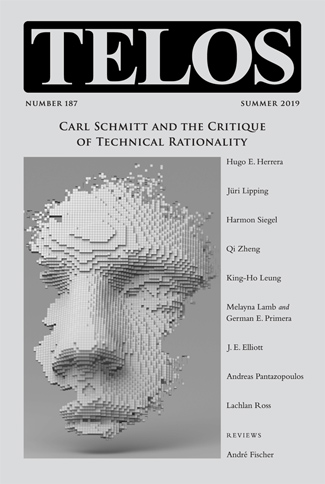Telos 187 (Summer 2019) is now available for purchase in our store. Individual subscriptions to Telos are also available in both print and online formats.
 After a modern era of technological progress that has led humans to believe in their increasing ability to control nature, we are reaching a point at which this power on a small scale has given way to increasing uncertainty and uncontrollability on the large scale. Not only are the specific effects of climate change difficult to predict and control, the only mechanisms available for such control—agreement and cooperation across national and cultural divides—are not the stuff of engineering but of politics. So with every technological advance that promises to bring us more control over our lives, we as a species are facing ever greater risks and uncertainties. The question concerning technology has become the unpredictability and uncontrollability of its development itself. The key difficulty is a problem of a tension between community or national interests and species-wide interests. While there might be an ethical imperative on a species-wide level to exercise self-restraint in pursuing dangerous technologies such as nuclear weapons, gene manipulation, or coal-fired power plants, such self-restraint could very well lead to the decline or even annihilation of the group that exercises it. The path forward will not be revealed by new technological advances, which can easily create more problems than they solve, but through the development of new ethical, political, and affective frameworks by which people understand themselves and their connections to the rest of the world. This issue of Telos, devoted to Carl Schmitt and the critique of technical rationality, investigates the ways in which Schmitt’s critique moved him toward ways of considering law, politics, and human history as fundamentally uncertain movements, requiring strategies that accept such unpredictability even as we try to intervene in our historical development as a species.
After a modern era of technological progress that has led humans to believe in their increasing ability to control nature, we are reaching a point at which this power on a small scale has given way to increasing uncertainty and uncontrollability on the large scale. Not only are the specific effects of climate change difficult to predict and control, the only mechanisms available for such control—agreement and cooperation across national and cultural divides—are not the stuff of engineering but of politics. So with every technological advance that promises to bring us more control over our lives, we as a species are facing ever greater risks and uncertainties. The question concerning technology has become the unpredictability and uncontrollability of its development itself. The key difficulty is a problem of a tension between community or national interests and species-wide interests. While there might be an ethical imperative on a species-wide level to exercise self-restraint in pursuing dangerous technologies such as nuclear weapons, gene manipulation, or coal-fired power plants, such self-restraint could very well lead to the decline or even annihilation of the group that exercises it. The path forward will not be revealed by new technological advances, which can easily create more problems than they solve, but through the development of new ethical, political, and affective frameworks by which people understand themselves and their connections to the rest of the world. This issue of Telos, devoted to Carl Schmitt and the critique of technical rationality, investigates the ways in which Schmitt’s critique moved him toward ways of considering law, politics, and human history as fundamentally uncertain movements, requiring strategies that accept such unpredictability even as we try to intervene in our historical development as a species.







